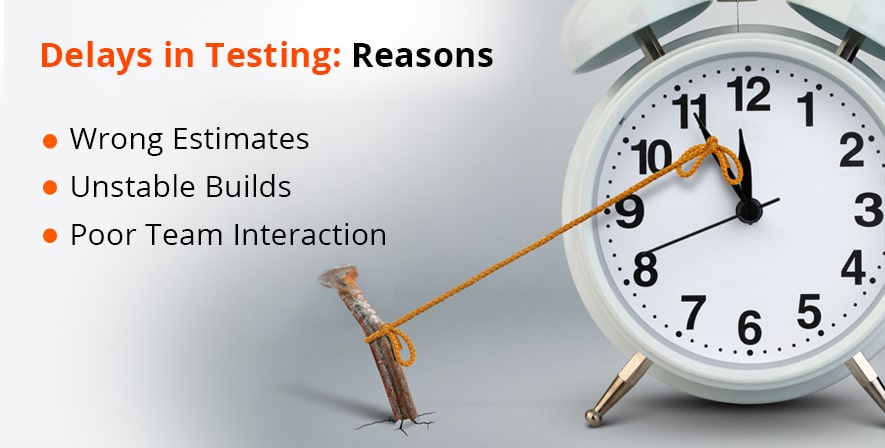- QATestLab Blog >
- QA Management >
- Testing Delay – Headache of Test Managers
Note: this article was updated in September 2019.
Have you ever been late? Let me guess the reason – you are constantly short for time. It’s one thing when you get late for a date (who didn’t?), but when you fail the project because of the time lack, outcomes may be not that harmless.
This article will hold the real case of delays in projects on quality assurance and step-by-step instructions on how to avoid this headache.
What causes delays in the process of software testing?
If we want to find the solution to a problem, we first have to define the reasons why it happened. So, what are the reasons for testing delays?

Reason #1 — Wrong Estimates
In order not to fail in the end, devote enough time for resource planning and estimation at the project start. Include the must-have points to your assessment:
- Time for preparation, i.e., planning of regression testing of the software, writing of test documentation, smoke testing.
- Maintainance of test cases: allocate some time (usually 1/3 of all testing time) for updating of the existing test cases as they are created for continuous usage. All the bug fixes and added functionality should be considered.
- Time for communication, i.e., all kinds of meetings, reporting, messaging, etc.
- Project management issues – it is recommended to include from 2 to 6 hours for management of a project, depending on its complexity.
- Pessimistic rate is added to the estimations in case of different contingencies.
Reason #2 — Unstable Builds
When the smoke tests fail, being deployed for quality assurance, there isn’t much you can do. The testing process is broken, and the delay is about to start. Another component of the technical issues is the lack/absence of test data. Of course, testers may prepare this information on their own, but this requires additional time and resources.
Reason #3 — Poor Team Interaction
Another common reason for delays in testing is miscommunication among the teams that work at a project: development, QA, operations managers, etc. Project methodologies that presuppose tight communication (Agile) are one of the ways out, nevertheless, they do not guarantee seamless interaction.
Below are the practical steps that may help you mitigate the possible delays and improve the developed testing strategy.
How to develop a software testing strategy to mitigate risks and delays?
If some of the above-listed reasons have influenced your testing cycle, consider one of the possible ways out that will help you to get to the goal with minimal losses.

Option 1: Limiting the testing scope
This option presupposes defining the functionality that is subjected to changes after bug fixes or adding new features. You do this to narrow the testing scope and save time for testing the critical functionality.
Option 2: Prioritizing the testing infrastructure
If you want to mitigate the possible risk of testing delay, consider the option of setting the priorities. Analyze the project data and divide the devices/browsers for testing into groups of high/medium/low priority. Analytics should be updated every month to follow the device market upgrades. Agree on this list with the client and save time in order not to test on the outdated devices or browsers.
Option 3: Limiting the testing infrastructure
If you see that the release is approaching ways faster than the QA team can at least approximately finish the set tasks, limit the number of devices/browsers to test on. You can use the devices according to their priority (see Option 2) and skip the old versions of OSs or browsers, which will help your team to update the test coverage.
How can a tester get enough time for testing?
Everything is clear with the main task of testers – to test the product. Although QATestLab specialists revealed us all the truth:
“Testing itself is only half the battle. There is plenty of tasks besides it: planning, estimations, documentation, result recording, communication, etc. Do we need all of this? Totally. The results of our work are no less important than the testing process, as this is why we do this.”
QA engineers should work in tandem with test leads and project managers. This cooperation will give them more time for testing, believe it or not. If you want to have enough time, follow these hints:
- Provide accurate estimations. Optimistic forecast is surely great, but when it comes to testing, it’s better to over-estimate (with reasonable limits) than to fail with meeting the set deadlines.
- Make use of test management tools as they will allow you to base your estimates and plans on the previous experience. Use these tools to save time on reporting, management, and test case preparation.
- Answer the following questions before planning your future activities:
- How much time did the previous testing cycle take?
- What issues were critical then?
- How much time was spent on fixing the reported issues?
- What is the basic functionality of the product you are about to test?
- What are the client’s requirements?
- Which functionality is the most vulnerable?
- What functions of the application customers appreciate most?
Keep recording your progress as this will show you the work productivity and serve a basis for future estimates.
Conclusion on time management in QA
It is often difficult to accurately forecast the time needed for testing and then meet this prognosis. Among the reasons that play against you are wrong estimations, unstable product under testing, poor team interaction. Follow the best practices of QATestLab testers to mitigate the possible risks and do your job in time with no compromise on its quality. Subscribe to our blog to get more useful advice every week.
Learn more from QATestLab
Related Posts:
- PM’s Notes: Why your Team Works Overtime
- Test planning: How to hit the mark?
- How Time Reports Help Manage QA Team?
About Article Author
view more articles
has 3-year experience in blogging, technical writing, and copywriting.
View More Articles






